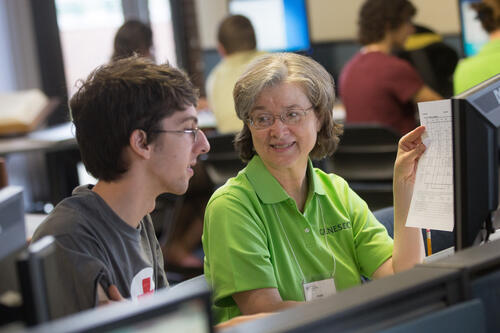
Joan Ballard, associate professor of psychology (SUNY Geneseo photo/Keith Walters)
Geneseo is continuing to implement the highest priority (Phase I) action items that were identified in the Geneseo 2021 Strategic Plan. Out of a pool of $1 million identified to advance those items, $350,000 was directed to time-sensitive student recruitment efforts. Last September, project leaders in charge of seven other action items shared proposals during a campus forum to secure funding available from the remaining $650,000 fund balance. Based on recommendations from the Budget Priorities Committee, made in consultation with the Strategic Planning Group, President Battles allocated various amounts across all seven action items.
Growing Student Success and Academic Advising through Goal Setting and Early Alert ($79,600)
There are plenty of factors that can hinder or even derail students’ academic success — from financial pressures to rigorous courses to personal health challenges and so much more. A hallmark of Geneseo, however, is its strong sense of community; in that regard, providing a variety of student support services can make all the difference to students who are struggling to meet demanding academic standards in their classes and labs.
Given the importance of retention, Celia Easton, dean of the Office of Academic Planning and Advising, is keenly aware how personal attention and academic guidance can help students identify their strengths — and make necessary adjustments that can foster success. She oversees an operation which directly assists students with registration, advising, graduation reviews to earn their diplomas, and skill sets integral to success — including study skills, consultation to help them stay on track, and strategies for communicating with faculty and mentors.
Easton will use funding allocated through the strategic planning process to help Geneseo address two objectives identified in Focus Area 2 — Access and Success: to pursue innovative and proactive retention and student success strategies, and to provide a welcoming and inclusive environment.
“Our goal in the Office of Academic Planning and Advising is simply this: we want to do the best possible job with the best possible services to help Geneseo students succeed in their academic pursuits,” Easton said.
Funds will be used to accomplish two broad goals. The first is to reshape academic planning and advising to include a focus on student services with the new inclusion of First Year Programs (orientation) and a redefinition/recasting of the associate dean role. To that end, Geneseo engaged a consultant from The National Academic Advising Association (NACADA) to conduct a site visit that included a review of the Office of Academic Planning and Advising, First Year Programs and the Office of Accessibility Services. Consultant Rich Robbins, academic associate dean for junior and senior students at Bucknell University, spent two days at Geneseo and will share his findings in a comprehensive report in the coming weeks.
The second goal is to develop a proactive approach to student success. Geneseo is exploring multiple vendors that provide academic institutions with comprehensive research, data analytics, and tools as part of a student success management system (SSMS).
Geneseo seeks an SSMS that allows multiple “watchers” and “nudgers” to provide early notification of student needs; data assessment and tracking of student grades as well as retention and progress in particular academic programs; a network of care/success resources such as counseling, financial aid, and more.
One-time start-up costs will be offset with a SUNY Performance Improvement Fund grant; final costs will be determined through a request for proposal process, with an SSMS vendor decision anticipated in fall 2018. According to Easton, tuition revenue generated by retaining students could pay for annual SSMS licensing and related fees.
“Using information gained from our NACADA consultant and introducing resources from the SSMS, we can better support students in their academic journey,” Easton noted. “That translates into better performance, persistence, and graduation rates.”
– Tony Hoppa